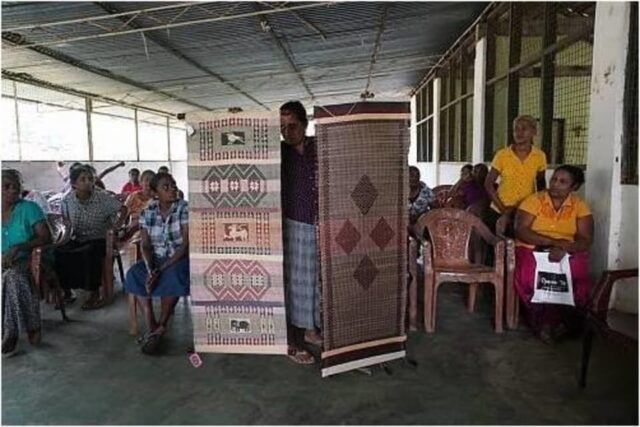Sri Lankan “Dumbara Rata Kalala”, or Dumbara mats, are traditional hand-made mats used as wall hangings, tapestries or cushion covers. The mats are made in a few villages, such as Kalasirigama and Alokagama, by a community called “kinnara” that traditionally supplied ornamental mats to the royal palace as part of their obligatory service to the crown and to ruling elites between the fifteenth and nineteenth centuries. Today, artisans weave the mats for local buyers and tourists.
The Dumbara Rata Kalala were recently inscribed by UNESCO on its prestigious Representative List of Intangible Cultural Heritage of Humanity. The announcement was made by UNESCO on 15 December, 2021 at the 16th Session of the Intergovernmental Committee – the organ that implements the 2003 International Convention for the Safeguarding of Intangible Cultural Heritage held from 13 to 18 December, 2021 at the UNESCO Headquarters in Paris.
UNESCO made this decision after examining a nomination prepared by a committee of experts appointed by, and working with, the Ministry of Buddhasasana, Religious, and Cultural Affairs in Sri Lanka, in association with the National Library of Sri Lanka, the Documentation Services Board of Sri Lanka, the Divisional Secretariat Offices of the two relevant districts, and the traditional crafts families of the two villages.

The inscription of the element will improve its visibility, enrich the craft practice, empower the crafts families, and ensure the viability of this important element. At the same time, potential dangers such as commercialization and over-exploitation were made aware, and steps to protect the element are already in place in the safeguarding plans.
On behalf of the Government of Sri Lanka and its people, Ambassador and Permanent Delegate of Sri Lanka to UNESCO Kshanika Hirimburegama expressed her immense appreciation and gratitude to UNESCO for inscribing the “Traditional craftsmanship of making Dumbara Ratā Kalāla” on the Representative List.
Further, she thanked the Ministry of Buddhasasana Religious and Cultural Affairs, crafts families, members of the nomination preparation team, well-wishers, who helped in numerous ways to prepare a successful nomination dossier, as well as the Evaluation Body for their excellent work done.
Source: Government News Portal



